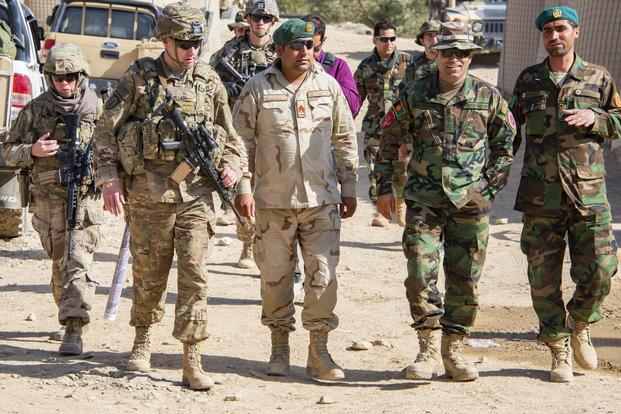On the eve of the 18th anniversary of the 9/11 attacks, plans to begin a withdrawal of U.S. troops from the nation's longest war in Afghanistan were scrapped and preparations were being made to ramp up attacks against the Taliban following the collapse of peace talks.
"I think we're talking a total spectrum" of new offensives to punish the Taliban, Marine Gen. Kenneth McKenzie, head of U.S. Central Command, said Monday at Bagram Air Base, north of Kabul, Reuters reported.
"And, again, whatever targets are available, whatever targets can be lawfully and ethically struck, I think we're going to pursue those targets," he told reporters traveling with him in the region, according to Reuters.
McKenzie's remarks, and the Taliban's stated intention to step up attacks, suggested that the war could go on indefinitely despite President Donald Trump's repeated declarations of his desire to end U.S. involvement.
Related: Trump Fires National Security Adviser John Bolton
Only last week, Zalmay Khalilzad, the U.S. Special Representative for Afghanistan Reconciliation, announced that an agreement "in principle" had been reached between the U.S. and the Taliban that would allow for the withdrawal of about 5,000 of the estimated 14,000 U.S. troops in Afghanistan within 135 days.
In a series of Tweets late Saturday, Trump said he had planned a secret meeting Sunday at the presidential retreat at Camp David in Maryland with representatives of the Taliban and Afghan President Ashraf Ghani to build on the tentative withdrawal agreement.
However, the president said he called off the meeting in response to a Taliban-claimed suicide bombing in Kabul last Thursday that killed at least 12, including Army Sgt. 1st Class Elis A. Barreto Ortiz, 34, of Puerto Rico, who was on his third deployment to Afghanistan.
Trump's initial plan to host representatives of the Taliban, which gave safe haven to al-Qaida and Osama Bin Laden, on U.S. soil only days before the 9/11 anniversary drew condemnation from within the Republican party.
"Never should leaders of a terrorist organization that has not renounced 9/11 and continues in evil be allowed in our great country. Never. Full stop," Rep. Adam Kinzinger, R-Illinois, an Air Force veteran who served in Afghanistan, said Sunday on CNN.
In a series of Tweets on Saturday, Trump said, "The major Taliban leaders and, separately, the President of Afghanistan, were going to secretly meet with me at Camp David on Sunday.
"Unfortunately, in order to build false leverage, they admitted to an attack in Kabul that killed one of our great great soldiers, and 11 other people. I immediately cancelled the meeting and called off peace negotiations," he continued.
At an impromptu news conference at the White House on Monday, before he departed for a campaign rally in North Carolina, Trump said peace talks with the Taliban "are dead. As far as I'm concerned, they are dead" for the time being.
However, he left open the possibility that an arrangement might eventually be reached that would allow for U.S. troop withdrawals. "We'd like to get out, but we'll get out at the right time," he said.
The attack last Thursday cited by Trump was only one of a series carried out by the resurgent Taliban even as they participated in nine rounds of peace negotiations with Khalilzad in Doha, Qatar.
The U.S. military last estimated in January that the Taliban had control or major influence in about 37% of the territory in which the Afghan population lives.
The Pentagon no longer gives estimates on Taliban control, or on casualties among Afghan security forces. Estimates by the Office of the U.S. Special Inspector General for Afghan Reconstruction (SIGAR) have put Taliban control at about half of the country's districts.
According to the Defense Department, the war in Afghanistan since 2001 has cost the lives of more than 2,400 U.S. troops.
The cost to taxpayers has been at least $975 billion through June of this year, according to funds authorized in defense budgets for Overseas Contingency Operations dedicated to Afghanistan.
The U.S. troop presence in Afghanistan has gone up and down through three White House administrations.
The initial invasion shortly after the 9/11 attacks met with almost complete success. Small contingents of U.S. troops on the ground, partnering with the mostly Tajik Northern Alliance and backed mainly by U.S. Navy airpower, drove the Taliban and al-Qaida from Afghanistan and installed a new government in Kabul.
However, the war in Afghanistan took a backseat to the invasion of Iraq in 2003, and the Taliban and al-Qaida began regaining influence.
In 2011, President Barack Obama ordered a massive troop increase, building up U.S. forces to more than 100,000, but put them on a two-year timeline to achieve success. By the time Obama left office, the U.S. troop presence had dwindled to about 8,600.
In 2017, while maintaining that he was reluctant to do so, Trump agreed with Pentagon recommendations to boost the U.S. troop presence to about 14,000 in an effort to drive the Taliban to the peace table.
In the run-up to the canceled Camp David meeting with the Taliban, several news outlets reported on tensions among Trump's top advisers over the approach to the insurgents. Secretary of State Mike Pompeo reportedly was at odds with National Security Adviser John Bolton, who was against a deal.
Trump dismissed the reports as "Fake News," but on Tuesday announced that he had fired Bolton. In a series of Tweets, he wrote, "I informed John Bolton last night that his services are no longer needed at the White House.
"I disagreed strongly with many of his suggestions, as did others in the administration, and therefore asked John for his resignation, which was given to me this morning," Trump continued. "I thank John very much for his service. I will be naming a new National Security Advisor next week."
-- Richard Sisk can be reached at Richard.Sisk@Military.com.
Read more: The Air Force Just Dropped 80,000 Pounds of Bombs on Island 'Infested' with ISIS Fighters












